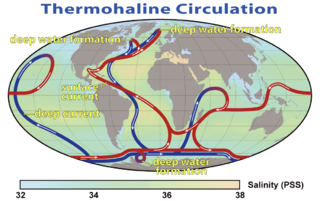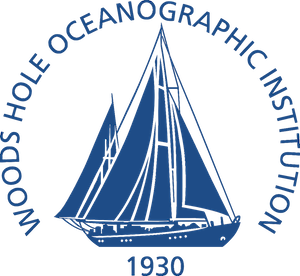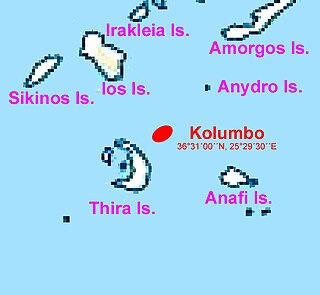
Oceanography, also known as oceanology and ocean science, is the scientific study of the oceans. It is an Earth science, which covers a wide range of topics, including ecosystem dynamics; ocean currents, waves, and geophysical fluid dynamics; plate tectonics and the geology of the sea floor; and fluxes of various chemical substances and physical properties within the ocean and across its boundaries. These diverse topics reflect multiple disciplines that oceanographers utilize to glean further knowledge of the world ocean, including astronomy, biology, chemistry, climatology, geography, geology, hydrology, meteorology and physics. Paleoceanography studies the history of the oceans in the geologic past. An oceanographer is a person who studies many matters concerned with oceans, including marine geology, physics, chemistry and biology.

The Woods Hole Oceanographic Institution is a private, nonprofit research and higher education facility dedicated to the study of marine science and engineering.

The MIT Media Lab is a research laboratory at the Massachusetts Institute of Technology, growing out of MIT's Architecture Machine Group in the School of Architecture. Its research does not restrict to fixed academic disciplines, but draws from technology, media, science, art, and design. As of 2014, Media Lab's research groups include neurobiology, biologically inspired fabrication, socially engaging robots, emotive computing, bionics, and hyperinstruments.

Joichi "Joi" Ito is a Japanese entrepreneur and venture capitalist. He is a former director of the MIT Media Lab, former professor of the practice of media arts and sciences at MIT, and a former visiting professor of practice at the Harvard Law School. Ito has received recognition for his role as an entrepreneur focused on Internet and technology companies and has founded, among other companies, PSINet Japan, Digital Garage, and Infoseek Japan. Ito is a strategic advisor to Sony Corporation and general partner of Neoteny Labs. Ito wrote a monthly column in the Ideas section of Wired.

Kolumbo is an active submarine volcano in the Aegean Sea in Greece, about 8 km northeast of Cape Kolumbo, Santorini island. The largest of a line of about twenty submarine volcanic cones extending to the northeast from Santorini, it is about 3 km in diameter with a crater 1.5 km across. It was "discovered" when it breached the sea surface in 1649-50, but its explosion was not to be compared to the well-known Thera explosion and caldera collapse, currently dated ca. 1630 BCE, with its devastating consequences for Minoan civilization. The Smithsonian Institution's Global Volcanism Program treats it as part of the Santorini volcano, though at least one source maintains that it is a separate magmatic system.

Global Explorer ROV is a unique deep water remotely operated vehicle that has made numerous dives below 9,000 feet (2,700 m) on science and survey expeditions for National Geographic, the National Oceanographic and Atmospheric Administration (NOAA) and other research organizations. It was designed and built by Chris Nicholson of Deep Sea Systems International, Inc. of Falmouth, Massachusetts.
Cindy Lee Van Dover is the Harvey Smith Professor of Biological Oceanography and chair of the Division of Marine Science and Conservation at Duke University. She is also the director of the Duke University Marine Laboratory. Her primary area of research is oceanography, but she also studies biodiversity, biogeochemistry, conservation biology, ecology, and marine science.

Gregory Schofield Stone is an ocean scientist, explorer, and marine conservationist. He has published research on marine mammals in Antarctica, on ice ecology, and on New Zealand's Hector's dolphin. Stone is also an undersea technology and exploration specialist, particularly in his use of deep-sea submersibles, and has produced a series of marine conservation films.

Dawn Jeannine Wright is an American geographer and oceanographer. She is a leading authority in the application of geographic information system (GIS) technology to the field of ocean and coastal science, and played a key role in creating the first GIS data model for the oceans. Wright is Chief Scientist of the Environmental Systems Research Institute. She has also been a professor of geography and oceanography at Oregon State University since 1995 and is a former Oregon Professor of the Year as named by the Council for the Advancement and Support of Education and the Carnegie Foundation for the Advancement of Teaching. Wright was the first African-American female to dive to the ocean floor in the deep submersible ALVIN. On July 12, 2022 she became the first Black person to dive to Challenger Deep, the deepest point on Earth, and to successfully operate a sidescan sonar at full-ocean depth.

Samantha "Mandy" Joye is an American oceanographer who is well known for her work studying the Deepwater Horizon Oil Spill. She is a professor at the University of Georgia in the Department of Marine Sciences. Joye has made fundamental contributions in ocean biogeochemistry and microbial ecology, and is also regularly called upon by scientific and policy agencies as well as the media for expert commentary on ocean ecology. She was the expedition scientist and a lead science advisor for The Deep episode, part of the BBC's Blue Planet II, and is featured in production videos including Brine Pools: Exploring an Alien World for Blue Planet II and Future of the Oceans. She led the “Ecosystem Impacts of Oil and Gas in the Gulf” research consortium between 2014 and 2020 and conducts research to understand relationships between biogeochemical cycles, microbial activity, and environmental factors in many diverse ocean environments.

Diva Joan Amon is a marine biologist from Trinidad. She is currently a post-doctoral researcher in the Benioff Ocean Initiative at the University of California, Santa Barbara and a 2022 Pew Marine Fellow. Previously, she was a Marie Skłodowska-Curie Actions (MSCA) Research Fellow at the Natural History Museum, London.

Heidi Sosik is an American biologist, oceanographer, and inventor based at the Woods Hole Oceanographic Institution.

Darlene Sze Shien Lim is a NASA geobiologist and exobiologist who prepares astronauts for scientific exploration of the Moon, Deep Space and Mars. Her expertise involves Mars human analog missions, in which extreme landscapes like volcanoes and Arctic deserts serve as physical or operational substitutes for various planetary bodies. She has become a leading public figure for Mars exploration, having presented her missions publicly at academic institutions and public events around the world. She has also discussed her work for various media groups such as NPR, The New York Times, and The Washington Post.
OceanX is an ocean exploration initiative founded by Mark Dalio and Ray Dalio, founder of investment firm Bridgewater Associates, An initiative by Dalio Philanthropies, OceanX is a “mission to explore the ocean and bring it back to the world. OceanX combines science, technology and media to explore and raise awareness for the oceans and “create a community engaged with protecting them.” The initiative also supports and facilitates ocean research for scientists, science institutions, media companies and philanthropy partners.

Derya Akkaynak is a Turkish mechanical engineer and oceanographer at the Harbor Branch Oceanographic Institute. She was a 2019 finalist for the Blavatnik Awards for Young Scientists.
Deborah Sue Kelley is a marine geologist who studies hydrothermal vents, active submarine volcanoes, and life in these regions of the deep ocean.
Paula Susan Bontempi is an oceanographer who has led the use of satellites in marine science during her positions in NASA and as the dean of the Graduate School of Oceanography at the University of Rhode Island.
Elizabeth Trembath-Reichert is a geomicrobiologist and astrobiologist at Arizona State University's School of Earth and Space Exploration.

Catalina Martinez is a regional program manager for the National Oceanic and Atmospheric Administration's (NOAA) Office of Ocean Exploration and Research (OER). She attended the University of Rhode Island for both her undergraduate and graduate studies. She is currently based at the University of Rhode Island's Graduate School of Oceanography. Her career focuses on coordinating programs for NOAA as well as promoting diversity and inclusion for underrepresented communities in STEM.
Allison Fundis is a marine geologist, ocean explorer and chief operating officer for the Ocean Exploration Trust. She has led or participated in over 50 expeditions at sea across the world, and in 2021 was named as an Emerging Explorer by the National Geographic Society.














